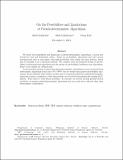On the Possibilities and Limitations of Pseudodeterministic Algorithms
Author(s)
Goldreich, Oded; Goldwasser, Shafi; Ron, Dana
DownloadAccepted version (250.0Kb)
Terms of use
Metadata
Show full item recordAbstract
We study the possibilities and limitations of pseudodeterministic algorithms, algorithms, a notion put forward by Gat and Goldwasser (2011). These are probabilistic algorithms that solve search problems such that on each input, with high probability, they output the same solution, which may be thought of as a canonical solution. We consider both the standard setting of (probabilistic) polynomial-time algorithms and the setting of (probabilistic) sublinear-time algorithms. Some of our results are outlined next. In the standard setting, we show that pseudodeterministic algorithms are more powerful than deterministic algorithms if and only if P ≠ BPP, but are weaker than general probabilistic algorithms. In the sublinear-time setting, we show that if a search problem has a pseudodeterministic algorithm of query complexity q, then this problem can be solved deterministically making O(q4) queries. This refers to total search problems. In contrast, for several natural promise search problems, we present pseudodeterministic algorithms that are much more efficient than their deterministic counterparts. © 2013 ACM.
Date issued
2013Department
Massachusetts Institute of Technology. Computer Science and Artificial Intelligence Laboratory; Massachusetts Institute of Technology. Department of Electrical Engineering and Computer SciencePublisher
Association for Computing Machinery (ACM)
Citation
Goldreich, Oded, Goldwasser, Shafi and Ron, Dana. 2013. "On the Possibilities and Limitations of Pseudodeterministic Algorithms."
Version: Author's final manuscript